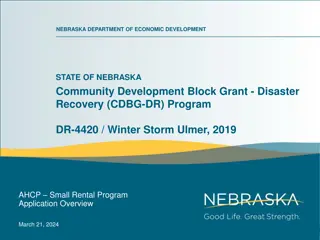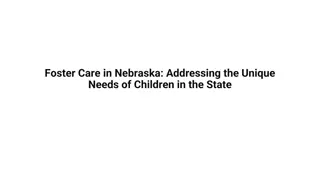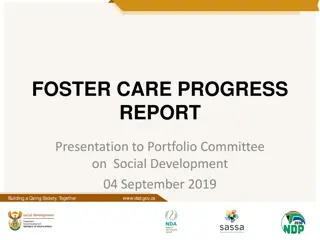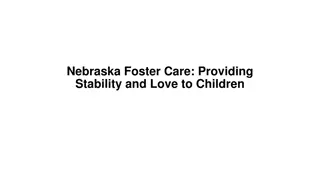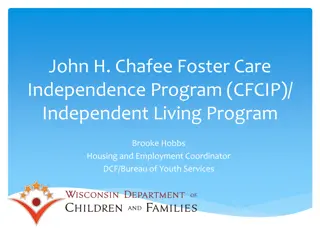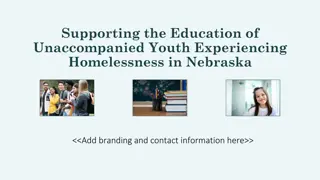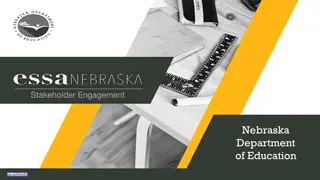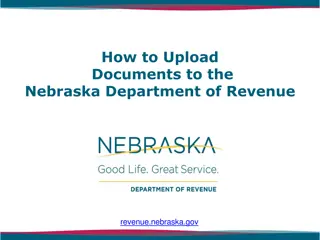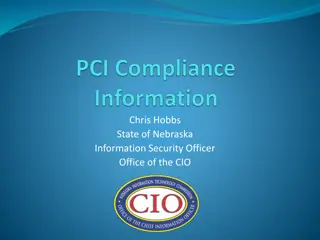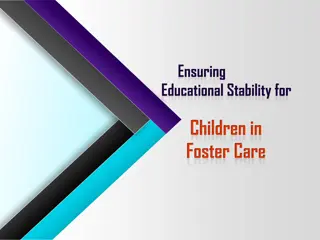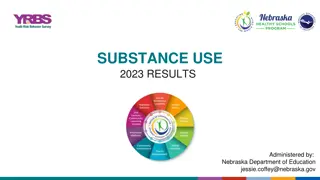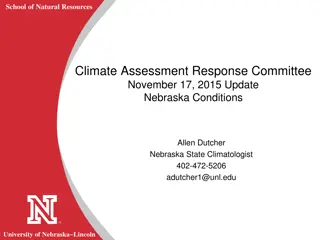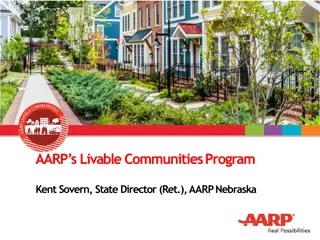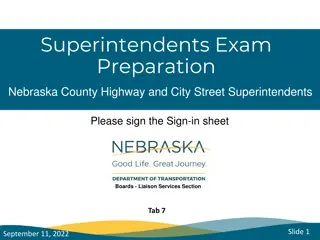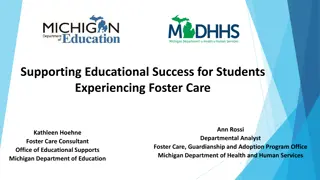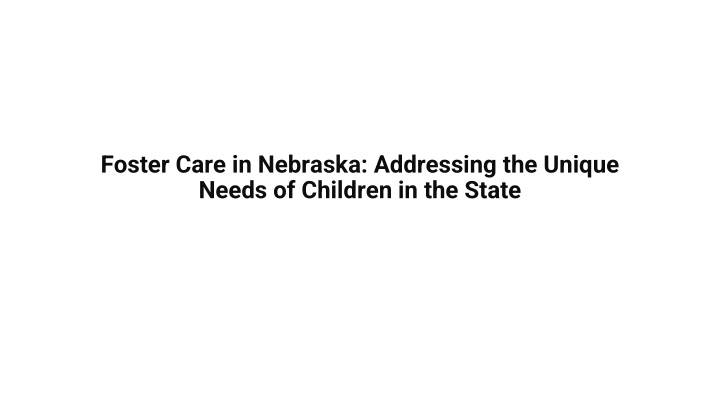
Foster Care in Nebraska Addressing the Unique Needs of Children in the State
Foster care is a critical system designed to provide safe and nurturing environments for children who cannot live with their biological families.
Download Presentation

Please find below an Image/Link to download the presentation.
The content on the website is provided AS IS for your information and personal use only. It may not be sold, licensed, or shared on other websites without obtaining consent from the author. If you encounter any issues during the download, it is possible that the publisher has removed the file from their server.
You are allowed to download the files provided on this website for personal or commercial use, subject to the condition that they are used lawfully. All files are the property of their respective owners.
The content on the website is provided AS IS for your information and personal use only. It may not be sold, licensed, or shared on other websites without obtaining consent from the author.
E N D
Presentation Transcript
Foster Care in Nebraska: Addressing the Unique Needs of Children in the State
Foster care is a critical system designed to provide safe and nurturing environments for children who cannot live with their biological families. In Nebraska, the foster care system faces unique challenges and opportunities in addressing the needs of children in the state. This blog post delves into the specifics of foster care in Nebraska, the unique needs of foster children, and how the system works to support these vulnerable individuals.
Understanding Foster Care in Nebraska Foster care in Nebraska involves placing children in temporary homes with foster families who provide care and support while the child's birth family works towards reunification or other permanent solutions are found. The goal of foster care is to ensure that children have a safe, stable, and loving environment during times of family crisis.
The Unique Needs of Foster Children in Nebraska Foster children often come from backgrounds of trauma, neglect, and abuse. Addressing their unique needs requires a comprehensive and compassionate approach. Here are some of the key needs of foster children in Nebraska: 1. Emotional and Psychological Support Foster children frequently experience emotional and psychological trauma due to their past experiences. Providing therapeutic services, including counseling and mental health support, is essential to help them heal and build resilience. 2. Educational Stability Frequent moves and instability can disrupt a child's education. Ensuring that foster children have access to stable and supportive educational environments is crucial for their academic success and future opportunities.
3. Health Care Foster children often have unmet healthcare needs. Comprehensive healthcare services, including medical, dental, and mental health care, are vital to ensure their overall well-being. 4. Permanent Connections While foster care is temporary, building permanent connections is important for a child's sense of security and belonging. Efforts are made to reunite children with their birth families whenever possible or to find adoptive families when reunification is not an option. 5. Life Skills Development Preparing foster children for adulthood involves teaching them essential life skills. Programs that focus on financial literacy, job readiness, and independent living skills are important for their successful transition to adulthood.
Foster Care Requirements in Nebraska To address the unique needs of foster children, Nebraska has established specific requirements for foster parents. These requirements ensure that foster families are well-prepared to provide the necessary care and support. Here are the general foster care requirements in Nebraska: 1.Age and Income: Foster parents must be at least 21 years old and have a stable income to support the child's needs. 2.Training: Prospective foster parents must complete a pre-service training program that covers topics such as child development, trauma-informed care, and the foster care system. 3.Home Study: A home study is conducted to evaluate the prospective foster parents' home environment, lifestyle, and overall readiness to care for a child. 4.Licensing: Foster parents must obtain a foster care license through the state of Nebraska. This involves meeting all the necessary requirements and passing a background check. 5.Ongoing Support: After becoming licensed, foster parents receive ongoing training and support to help them navigate the challenges of foster parenting.
How the Foster Care System Supports Children The foster care system in Nebraska is designed to provide comprehensive support to foster children. Here are some of the key ways the system works to support these vulnerable individuals: 1. Case Management Case managers play a critical role in the foster care system. They work closely with foster children and families to develop personalized care plans, monitor progress, and provide ongoing support. 2. Therapeutic Services Therapeutic services, including counseling and mental health support, are essential for helping foster children heal from past trauma and build emotional resilience.
3. Educational Support The foster care system collaborates with schools and educational institutions to ensure that foster children have access to stable and supportive educational environments. 4. Health Care Services Foster children receive comprehensive healthcare services, including medical, dental, and mental health care, to address their overall well-being. 5. Permanency Planning Efforts are made to reunite foster children with their birth families whenever possible. When reunification is not an option, the system works to find adoptive families or other permanent solutions to ensure long-term stability.
Foster care in Nebraska plays a vital role in addressing the unique needs of vulnerable children in the state. By providing comprehensive support and working towards permanency, the foster care system helps children heal, grow, and build brighter futures. If you are interested in becoming a foster parent or learning more about how you can support foster children in Nebraska, Guardian Light Family Services is here to help. They offer Agency Supported Foster Care, Family Support Services, and court-ordered Drug Testing to support families and children in need.
Guardian Light Family Services 509 E 4th St STE E, North Platte, NE 69101, United States +1 (308) 870-7260


